FORD ESCAPE 2010 2.G Owners Manual
Manufacturer: FORD, Model Year: 2010, Model line: ESCAPE, Model: FORD ESCAPE 2010 2.GPages: 345, PDF Size: 2.79 MB
Page 251 of 345
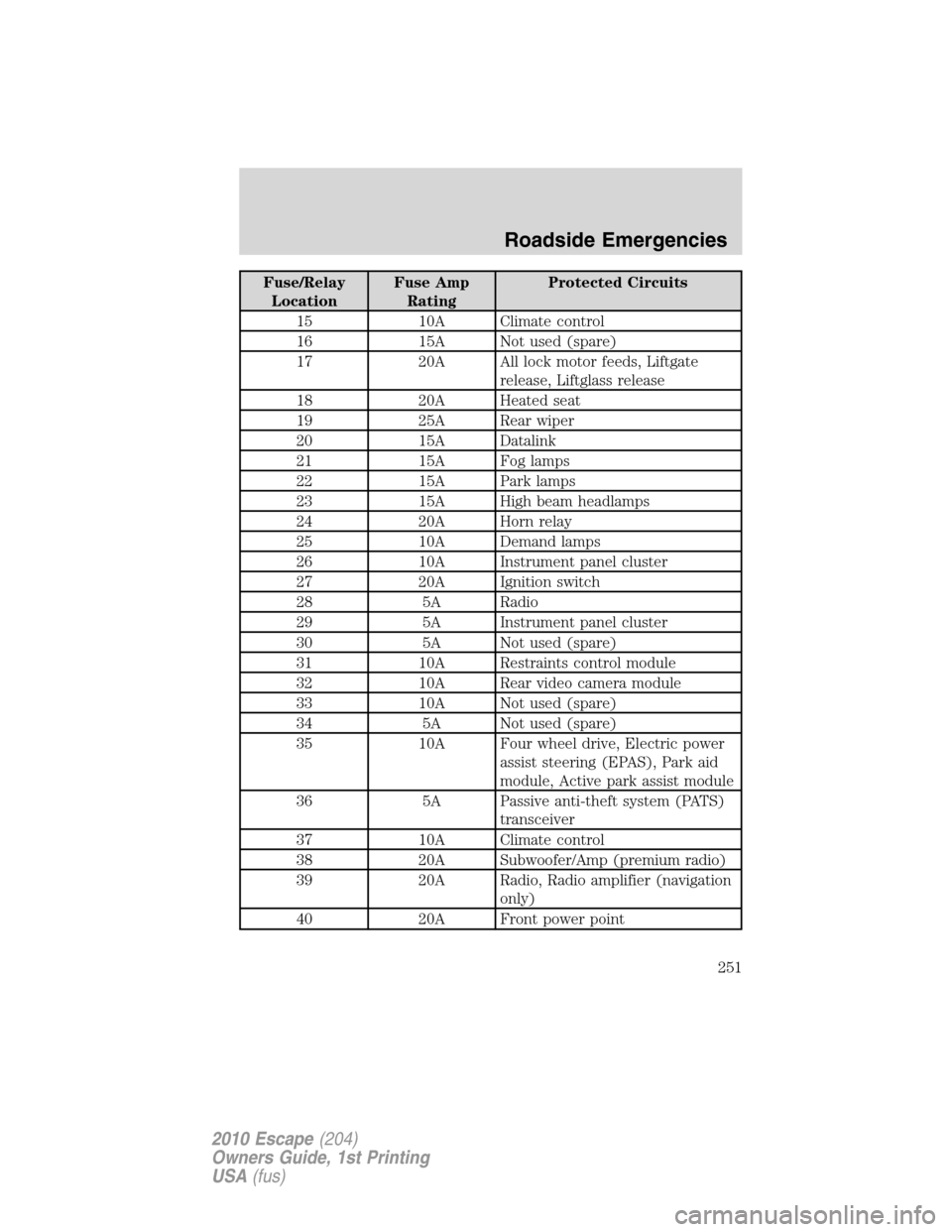
Fuse/Relay
LocationFuse Amp
RatingProtected Circuits
15 10A Climate control
16 15A Not used (spare)
17 20A All lock motor feeds, Liftgate
release, Liftglass release
18 20A Heated seat
19 25A Rear wiper
20 15A Datalink
21 15A Fog lamps
22 15A Park lamps
23 15A High beam headlamps
24 20A Horn relay
25 10A Demand lamps
26 10A Instrument panel cluster
27 20A Ignition switch
28 5A Radio
29 5A Instrument panel cluster
30 5A Not used (spare)
31 10A Restraints control module
32 10A Rear video camera module
33 10A Not used (spare)
34 5A Not used (spare)
35 10A Four wheel drive, Electric power
assist steering (EPAS), Park aid
module, Active park assist module
36 5A Passive anti-theft system (PATS)
transceiver
37 10A Climate control
38 20A Subwoofer/Amp (premium radio)
39 20A Radio, Radio amplifier (navigation
only)
40 20A Front power point
Roadside Emergencies
251
2010 Escape(204)
Owners Guide, 1st Printing
USA(fus)
Page 252 of 345
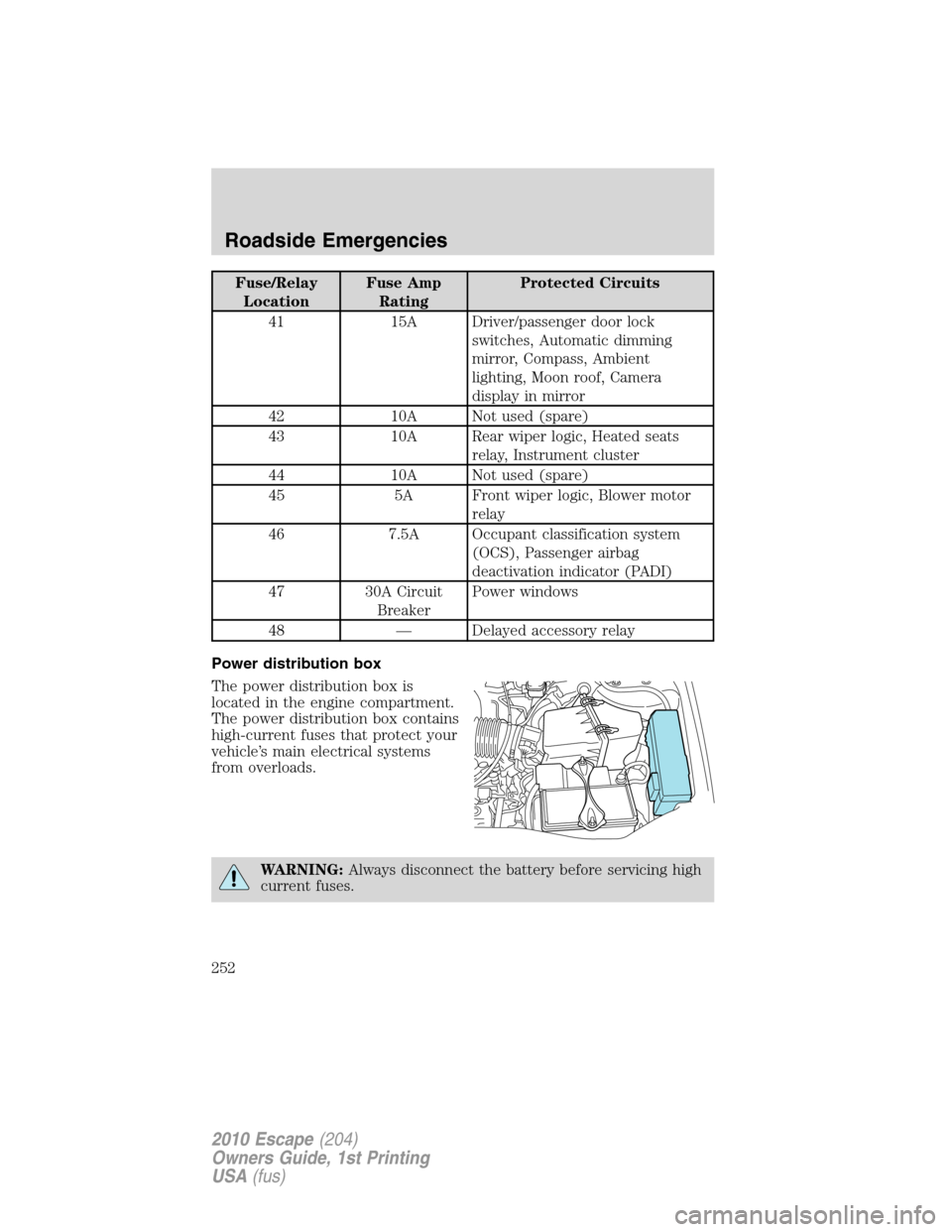
Fuse/Relay
LocationFuse Amp
RatingProtected Circuits
41 15A Driver/passenger door lock
switches, Automatic dimming
mirror, Compass, Ambient
lighting, Moon roof, Camera
display in mirror
42 10A Not used (spare)
43 10A Rear wiper logic, Heated seats
relay, Instrument cluster
44 10A Not used (spare)
45 5A Front wiper logic, Blower motor
relay
46 7.5A Occupant classification system
(OCS), Passenger airbag
deactivation indicator (PADI)
47 30A Circuit
BreakerPower windows
48 — Delayed accessory relay
Power distribution box
The power distribution box is
located in the engine compartment.
The power distribution box contains
high-current fuses that protect your
vehicle’s main electrical systems
from overloads.
WARNING:Always disconnect the battery before servicing high
current fuses.
Roadside Emergencies
252
2010 Escape(204)
Owners Guide, 1st Printing
USA(fus)
Page 253 of 345
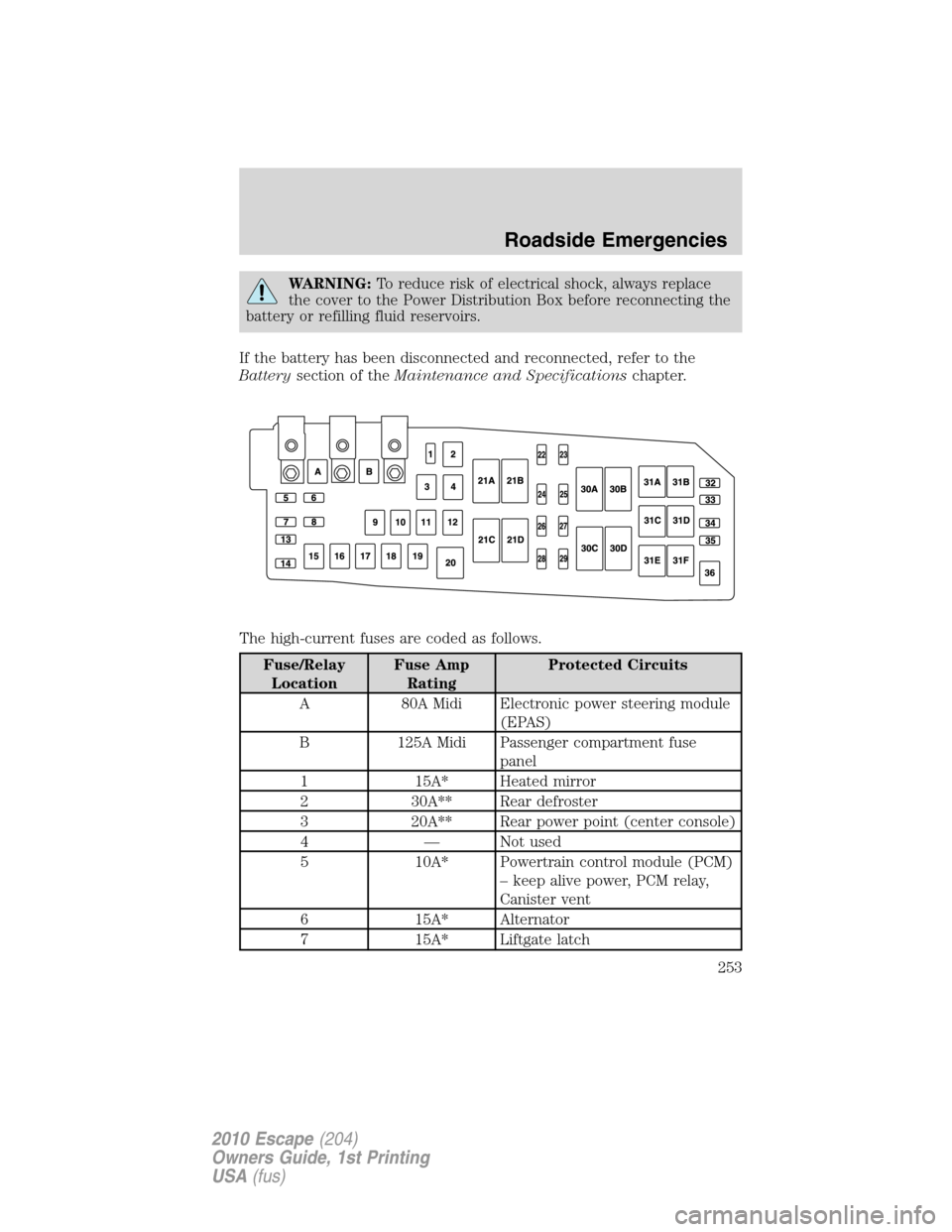
WARNING:To reduce risk of electrical shock, always replace
the cover to the Power Distribution Box before reconnecting the
battery or refilling fluid reservoirs.
If the battery has been disconnected and reconnected, refer to the
Batterysection of theMaintenance and Specificationschapter.
The high-current fuses are coded as follows.
Fuse/Relay
LocationFuse Amp
RatingProtected Circuits
A 80A Midi Electronic power steering module
(EPAS)
B 125A Midi Passenger compartment fuse
panel
1 15A* Heated mirror
2 30A** Rear defroster
3 20A** Rear power point (center console)
4 — Not used
5 10A* Powertrain control module (PCM)
– keep alive power, PCM relay,
Canister vent
6 15A* Alternator
7 15A* Liftgate latch
Roadside Emergencies
253
2010 Escape(204)
Owners Guide, 1st Printing
USA(fus)
Page 254 of 345
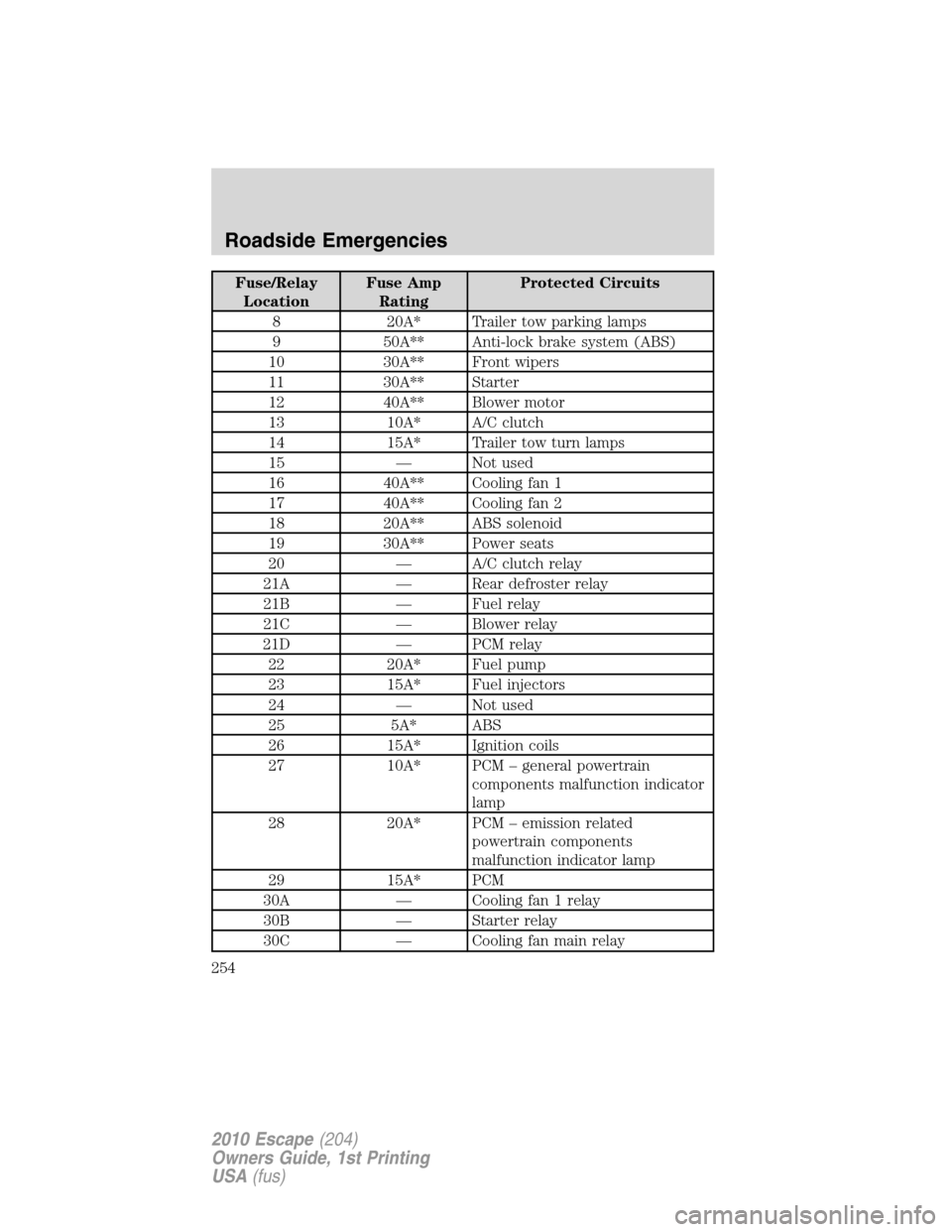
Fuse/Relay
LocationFuse Amp
RatingProtected Circuits
8 20A* Trailer tow parking lamps
9 50A** Anti-lock brake system (ABS)
10 30A** Front wipers
11 30A** Starter
12 40A** Blower motor
13 10A* A/C clutch
14 15A* Trailer tow turn lamps
15 — Not used
16 40A** Cooling fan 1
17 40A** Cooling fan 2
18 20A** ABS solenoid
19 30A** Power seats
20 — A/C clutch relay
21A — Rear defroster relay
21B — Fuel relay
21C — Blower relay
21D — PCM relay
22 20A* Fuel pump
23 15A* Fuel injectors
24 — Not used
25 5A* ABS
26 15A* Ignition coils
27 10A* PCM – general powertrain
components malfunction indicator
lamp
28 20A* PCM – emission related
powertrain components
malfunction indicator lamp
29 15A* PCM
30A — Cooling fan 1 relay
30B — Starter relay
30C — Cooling fan main relay
Roadside Emergencies
254
2010 Escape(204)
Owners Guide, 1st Printing
USA(fus)
Page 255 of 345
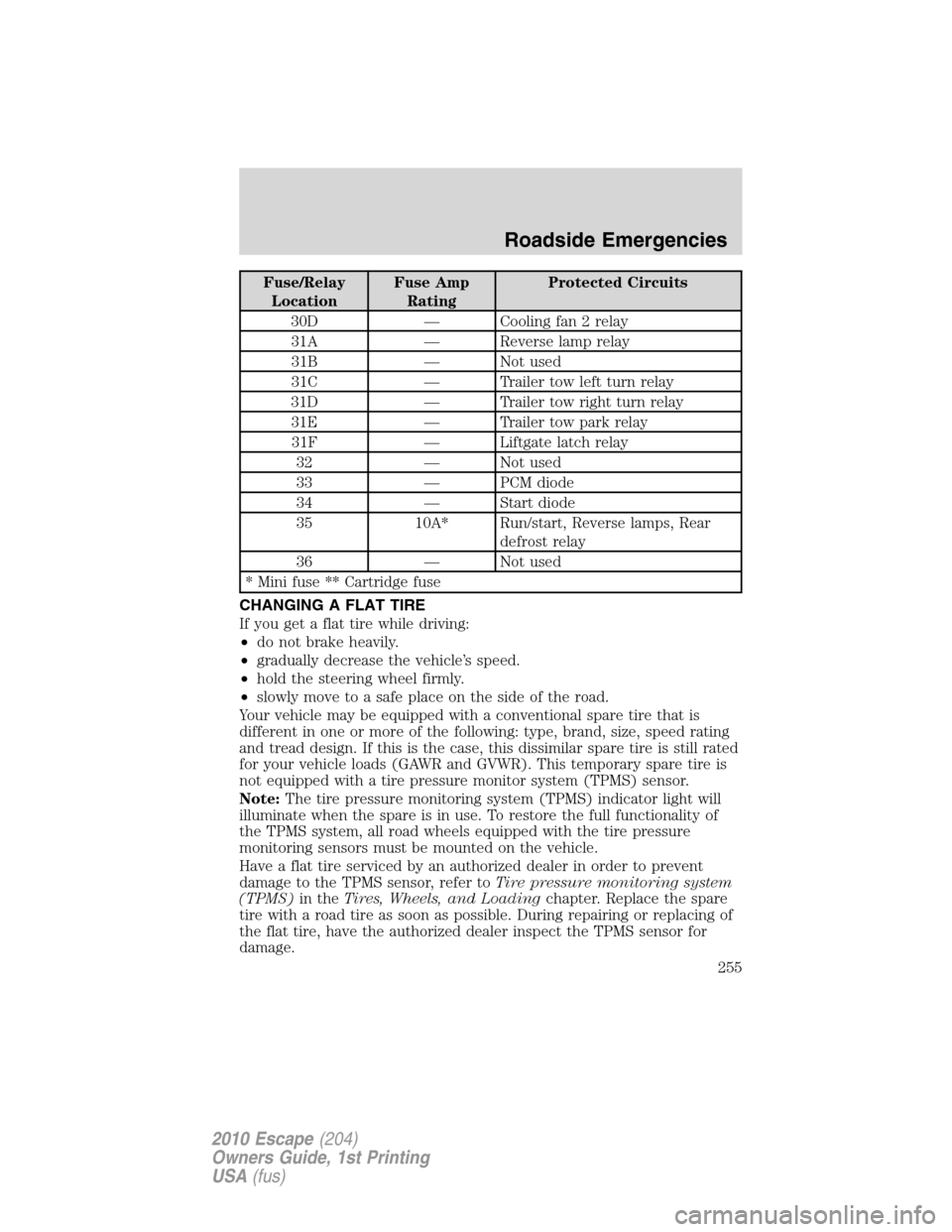
Fuse/Relay
LocationFuse Amp
RatingProtected Circuits
30D — Cooling fan 2 relay
31A — Reverse lamp relay
31B — Not used
31C — Trailer tow left turn relay
31D — Trailer tow right turn relay
31E — Trailer tow park relay
31F — Liftgate latch relay
32 — Not used
33 — PCM diode
34 — Start diode
35 10A* Run/start, Reverse lamps, Rear
defrost relay
36 — Not used
* Mini fuse ** Cartridge fuse
CHANGING A FLAT TIRE
If you get a flat tire while driving:
•do not brake heavily.
•gradually decrease the vehicle’s speed.
•hold the steering wheel firmly.
•slowly move to a safe place on the side of the road.
Your vehicle may be equipped with a conventional spare tire that is
different in one or more of the following: type, brand, size, speed rating
and tread design. If this is the case, this dissimilar spare tire is still rated
for your vehicle loads (GAWR and GVWR). This temporary spare tire is
not equipped with a tire pressure monitor system (TPMS) sensor.
Note:The tire pressure monitoring system (TPMS) indicator light will
illuminate when the spare is in use. To restore the full functionality of
the TPMS system, all road wheels equipped with the tire pressure
monitoring sensors must be mounted on the vehicle.
Have a flat tire serviced by an authorized dealer in order to prevent
damage to the TPMS sensor, refer toTire pressure monitoring system
(TPMS)in theTires, Wheels, and Loadingchapter. Replace the spare
tire with a road tire as soon as possible. During repairing or replacing of
the flat tire, have the authorized dealer inspect the TPMS sensor for
damage.
Roadside Emergencies
255
2010 Escape(204)
Owners Guide, 1st Printing
USA(fus)
Page 256 of 345
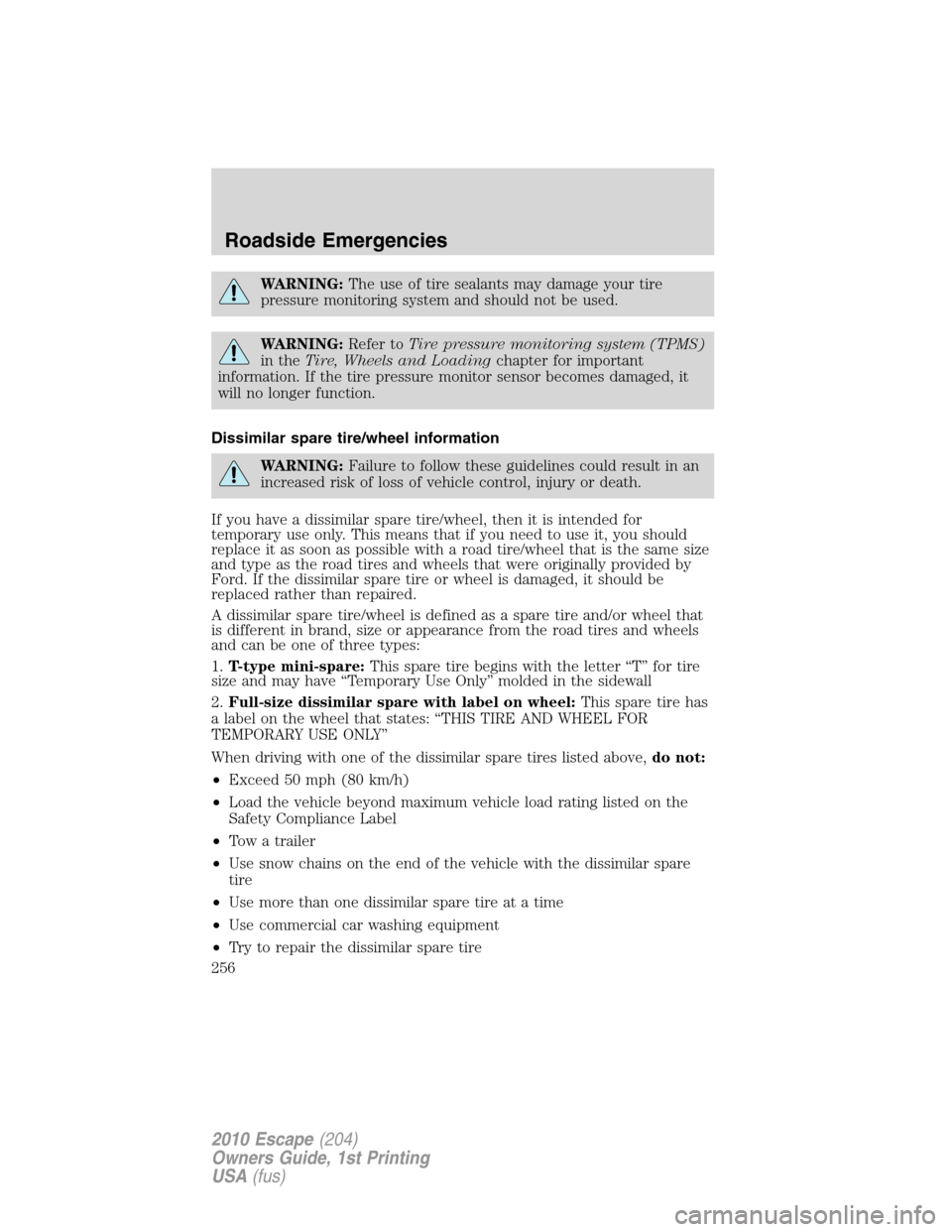
WARNING:The use of tire sealants may damage your tire
pressure monitoring system and should not be used.
WARNING:Refer toTire pressure monitoring system (TPMS)
in theTire, Wheels and Loadingchapter for important
information. If the tire pressure monitor sensor becomes damaged, it
will no longer function.
Dissimilar spare tire/wheel information
WARNING:Failure to follow these guidelines could result in an
increased risk of loss of vehicle control, injury or death.
If you have a dissimilar spare tire/wheel, then it is intended for
temporary use only. This means that if you need to use it, you should
replace it as soon as possible with a road tire/wheel that is the same size
and type as the road tires and wheels that were originally provided by
Ford. If the dissimilar spare tire or wheel is damaged, it should be
replaced rather than repaired.
A dissimilar spare tire/wheel is defined as a spare tire and/or wheel that
is different in brand, size or appearance from the road tires and wheels
and can be one of three types:
1.T-type mini-spare:This spare tire begins with the letter “T” for tire
size and may have “Temporary Use Only” molded in the sidewall
2.Full-size dissimilar spare with label on wheel:This spare tire has
a label on the wheel that states: “THIS TIRE AND WHEEL FOR
TEMPORARY USE ONLY”
When driving with one of the dissimilar spare tires listed above,do not:
•Exceed 50 mph (80 km/h)
•Load the vehicle beyond maximum vehicle load rating listed on the
Safety Compliance Label
•Tow a trailer
•Use snow chains on the end of the vehicle with the dissimilar spare
tire
•Use more than one dissimilar spare tire at a time
•Use commercial car washing equipment
•Try to repair the dissimilar spare tire
Roadside Emergencies
256
2010 Escape(204)
Owners Guide, 1st Printing
USA(fus)
Page 257 of 345
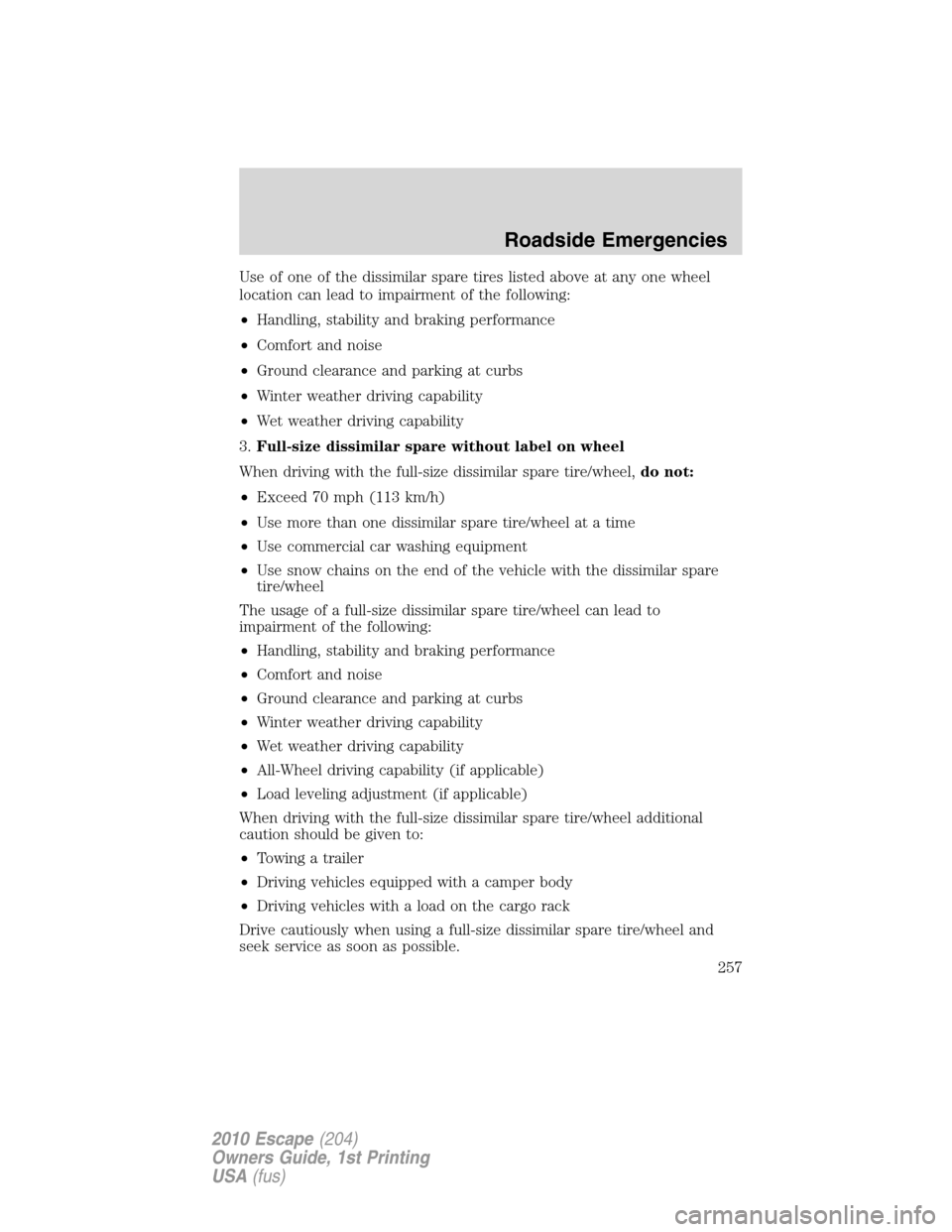
Use of one of the dissimilar spare tires listed above at any one wheel
location can lead to impairment of the following:
•Handling, stability and braking performance
•Comfort and noise
•Ground clearance and parking at curbs
•Winter weather driving capability
•Wet weather driving capability
3.Full-size dissimilar spare without label on wheel
When driving with the full-size dissimilar spare tire/wheel,do not:
•Exceed 70 mph (113 km/h)
•Use more than one dissimilar spare tire/wheel at a time
•Use commercial car washing equipment
•Use snow chains on the end of the vehicle with the dissimilar spare
tire/wheel
The usage of a full-size dissimilar spare tire/wheel can lead to
impairment of the following:
•Handling, stability and braking performance
•Comfort and noise
•Ground clearance and parking at curbs
•Winter weather driving capability
•Wet weather driving capability
•All-Wheel driving capability (if applicable)
•Load leveling adjustment (if applicable)
When driving with the full-size dissimilar spare tire/wheel additional
caution should be given to:
•Towing a trailer
•Driving vehicles equipped with a camper body
•Driving vehicles with a load on the cargo rack
Drive cautiously when using a full-size dissimilar spare tire/wheel and
seek service as soon as possible.
Roadside Emergencies
257
2010 Escape(204)
Owners Guide, 1st Printing
USA(fus)
Page 258 of 345
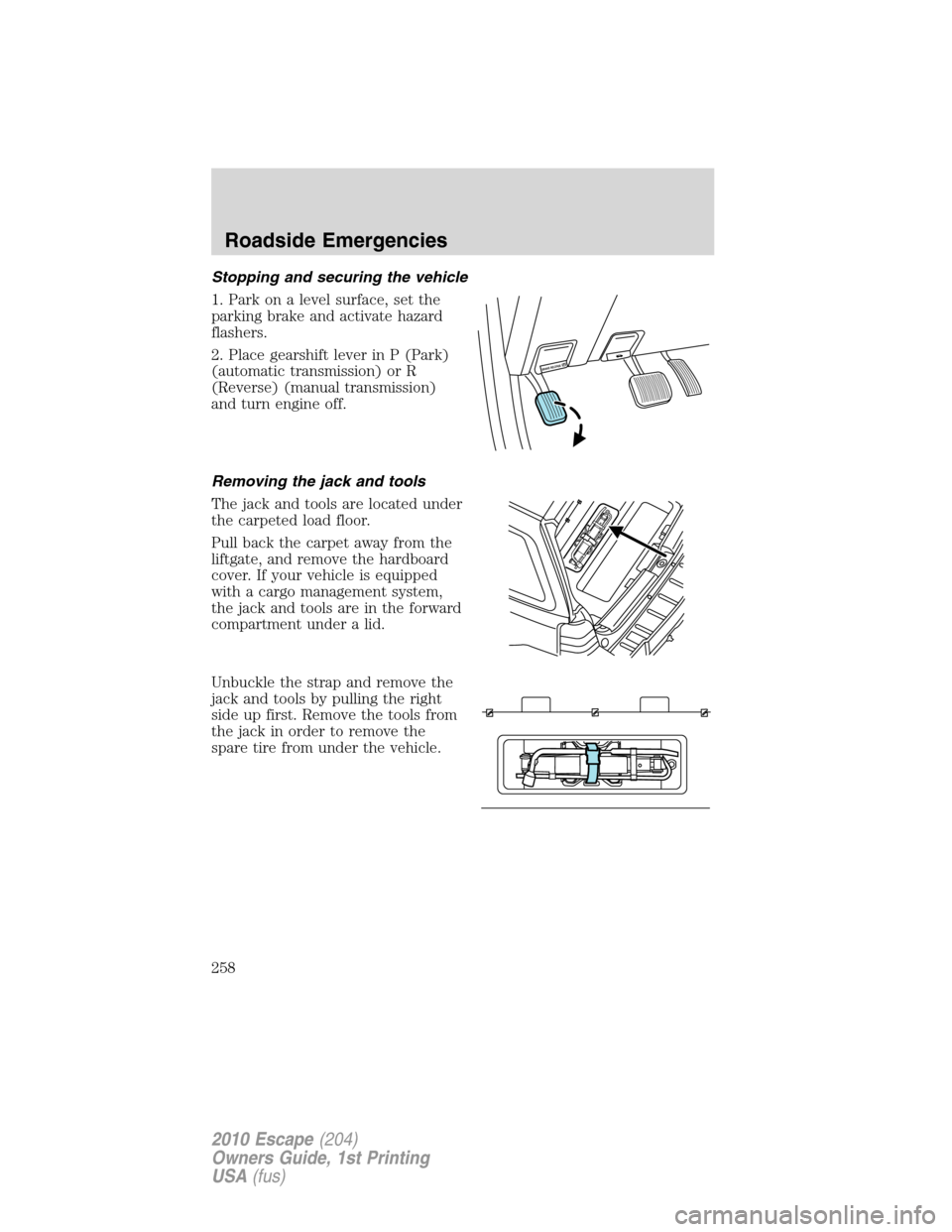
Stopping and securing the vehicle
1. Park on a level surface, set the
parking brake and activate hazard
flashers.
2. Place gearshift lever in P (Park)
(automatic transmission) or R
(Reverse) (manual transmission)
and turn engine off.
Removing the jack and tools
The jack and tools are located under
the carpeted load floor.
Pull back the carpet away from the
liftgate, and remove the hardboard
cover. If your vehicle is equipped
with a cargo management system,
the jack and tools are in the forward
compartment under a lid.
Unbuckle the strap and remove the
jack and tools by pulling the right
side up first. Remove the tools from
the jack in order to remove the
spare tire from under the vehicle.
BRAKE RELEASE P
Roadside Emergencies
258
2010 Escape(204)
Owners Guide, 1st Printing
USA(fus)
Page 259 of 345
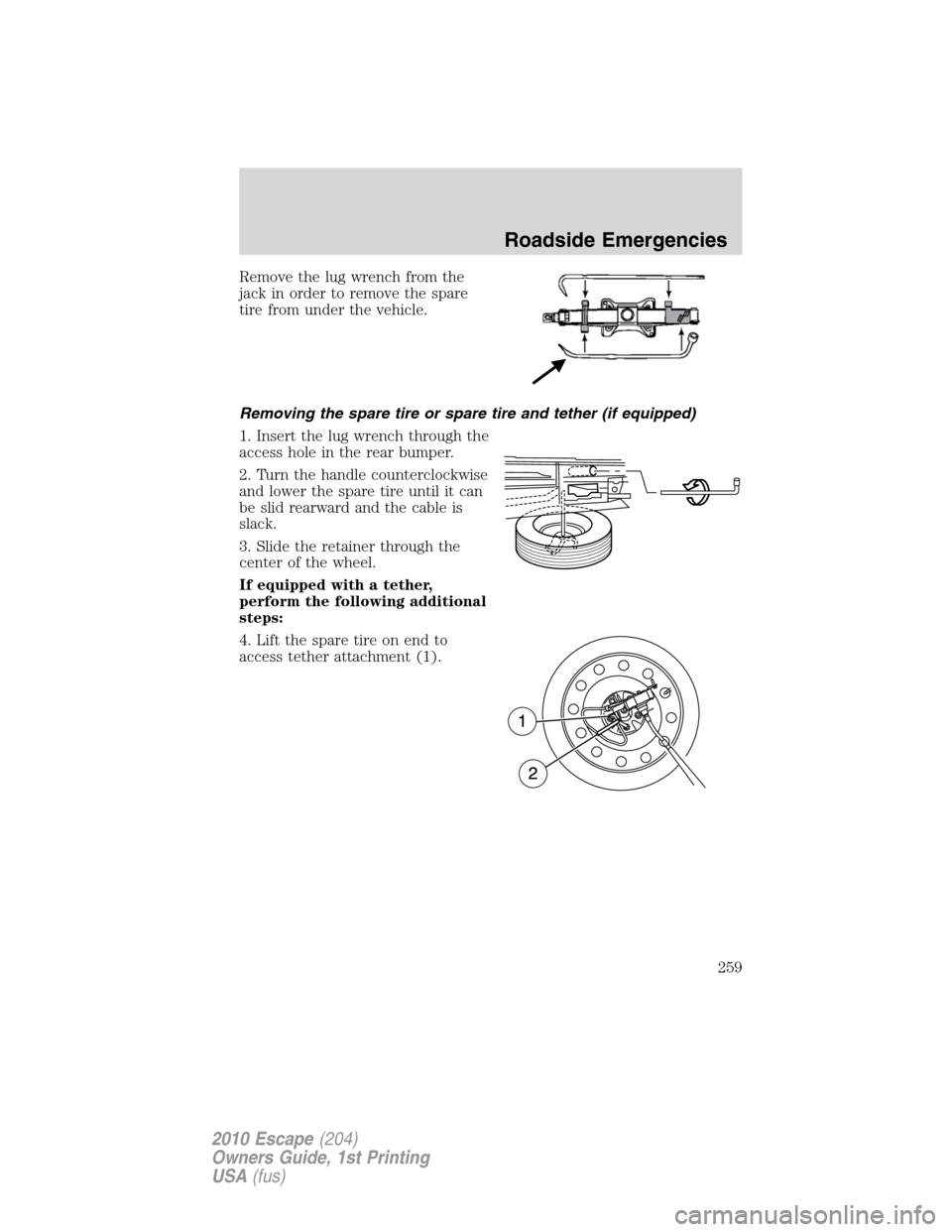
Remove the lug wrench from the
jack in order to remove the spare
tire from under the vehicle.
Removing the spare tire or spare tire and tether (if equipped)
1. Insert the lug wrench through the
access hole in the rear bumper.
2. Turn the handle counterclockwise
and lower the spare tire until it can
be slid rearward and the cable is
slack.
3. Slide the retainer through the
center of the wheel.
If equipped with a tether,
perform the following additional
steps:
4. Lift the spare tire on end to
access tether attachment (1).
Roadside Emergencies
259
2010 Escape(204)
Owners Guide, 1st Printing
USA(fus)
Page 260 of 345
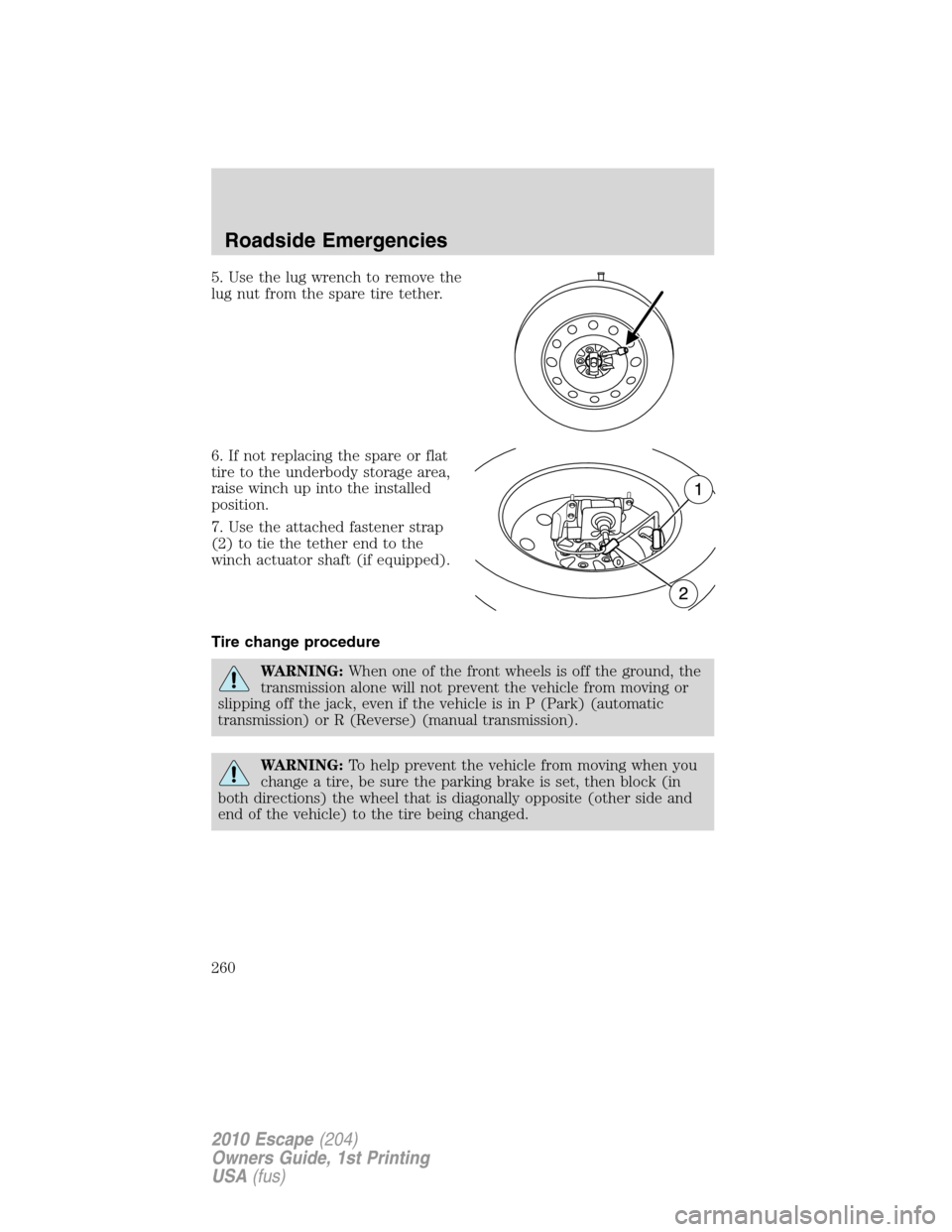
5. Use the lug wrench to remove the
lug nut from the spare tire tether.
6. If not replacing the spare or flat
tire to the underbody storage area,
raise winch up into the installed
position.
7. Use the attached fastener strap
(2) to tie the tether end to the
winch actuator shaft (if equipped).
Tire change procedure
WARNING:When one of the front wheels is off the ground, the
transmission alone will not prevent the vehicle from moving or
slipping off the jack, even if the vehicle is in P (Park) (automatic
transmission) or R (Reverse) (manual transmission).
WARNING:To help prevent the vehicle from moving when you
change a tire, be sure the parking brake is set, then block (in
both directions) the wheel that is diagonally opposite (other side and
end of the vehicle) to the tire being changed.
Roadside Emergencies
260
2010 Escape(204)
Owners Guide, 1st Printing
USA(fus)